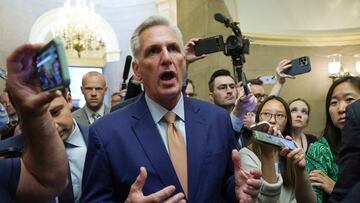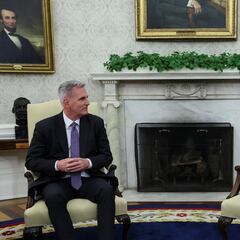Debt ceiling: What happens to your own debt in the US defaults?
If the United States were to default on its debt, it would have significant implications for the economy and financial markets.


While debt ceiling negotiations continue between Democrats and Republicans, the consequences for a debt default are still serious. An immediate impact of the US government failing to increase the debt ceiling would be a recession, plunging household spending and rapidly increasing unemployment.
There would be another impact too, for Americans loaded with debt. People would be struck by increased interest rates as the cost of government borrowing increases as credit ratings fall. Investors would demand higher returns to compensate for the increased risk. Ramsey Solutions estimates that the average debt per adult is $58,604 and more than three in every four adults have some kind of debt.
Shameful. And even more shameful if Dems agree to this despite the existence of the 14th amendment and the option of the platinum coin (not to mention their failure to push for a debt ceiling increase or abolition when they held both chambers). https://t.co/5hiLr9rZAs
— Mehdi Hasan (@mehdirhasan) May 22, 2023
A default’s affect on interest rates would affect everything from credit card debt, to student loans, and mortgages. Zillow estimates that a government default would push mortgage rates up to about 8.4% from the 6.4% interest rate on a 30-year fixed-rate mortgage at present.
Howard Gleckman, senior fellow of the Urban-Brookings Tax Policy Center at the Urban Institute, said if the US were to default then: “The primary effect would be interest rates going up significantly.”
Gleckman told NBC News,“[rates] are already going up quickly and steeply. What this would do is accelerate movement toward higher interest rates.”
How loans are affected by interest rates
Related stories
Personal loans with variable interest rates are loans where the interest rate fluctuates over time based on changes in a benchmark rate. When interest rates rise, the interest rate on your variable-rate personal loan will also increase, resulting in higher monthly payments. These loans would be immediately struck by a sharp increase in rates through a debt default.
Still no debt ceiling deal...@kaylatausche has the latest on the high-stakes negotiations, as the United States inches closer to default. pic.twitter.com/jP78ZWPLDk
— Squawk Box (@SquawkCNBC) May 24, 2023
Personal loans with fixed interest rates remain the same throughout the loan term, regardless of changes in the broader interest rate environment. Therefore, if you have a fixed-rate personal loan, interest rate changes in the market won’t directly affect your loan’s interest rate or monthly payments. However, it’s worth noting that prevailing interest rates can influence the overall cost of borrowing, as borrowers may opt for loans with lower rates, Refinancing these laons while interest rates increase will mean higher monthly payments.

